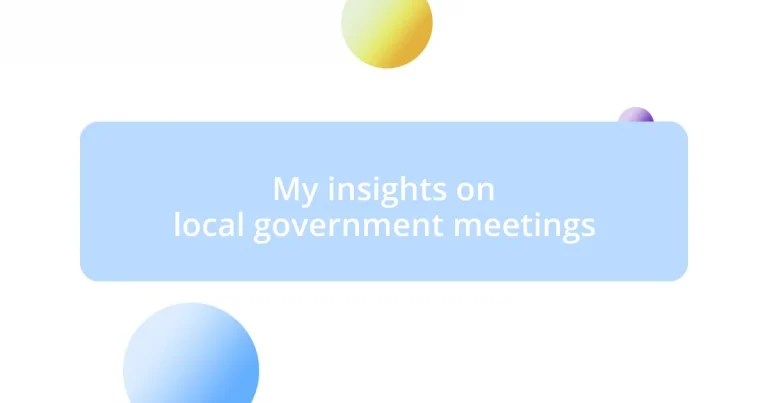Key takeaways:
- Local government meetings provide a vital platform for community engagement, allowing residents to voice their opinions and influence decisions that affect their neighborhoods.
- Preparation for meetings, including reviewing agendas and researching topics, enhances participation and enables meaningful contributions during discussions.
- Key issues to follow include budget allocations, zoning regulations, public safety, and infrastructure, which significantly impact community well-being.
- Following up after meetings—such as reaching out to officials and collaborating with other attendees—can strengthen community ties and promote advocacy for change.
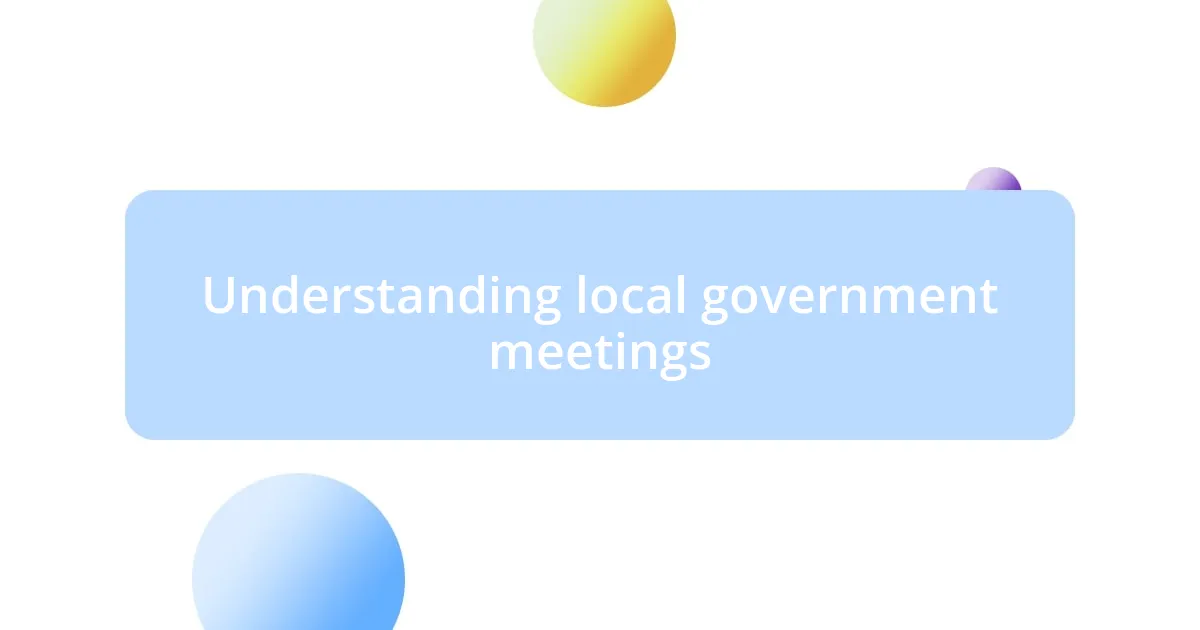
Understanding local government meetings
Local government meetings serve as a crucial platform where community voices can be heard. I remember attending one of my town hall meetings, feeling a mix of excitement and apprehension. It struck me how these gatherings shape the policies that affect our daily lives—everything from local traffic regulations to funding for parks and libraries.
These meetings aren’t just a bureaucratic necessity; they reflect the pulse of our community. As I sat there, listening to residents express their concerns and ideas, I felt a sense of belonging. Have you ever wondered how decisions that impact your neighborhood come to fruition? It often starts in these very rooms, where passionate individuals gather to discuss, debate, and decide.
Participating in local government meetings can be a transformative experience. I’ve seen firsthand how community engagement can lead to change. The energy in the room is palpable when people unite for a common cause, and it’s a reminder that our collective voices truly matter. Isn’t it empowering to know that each of us can contribute to shaping the future of our neighborhoods?
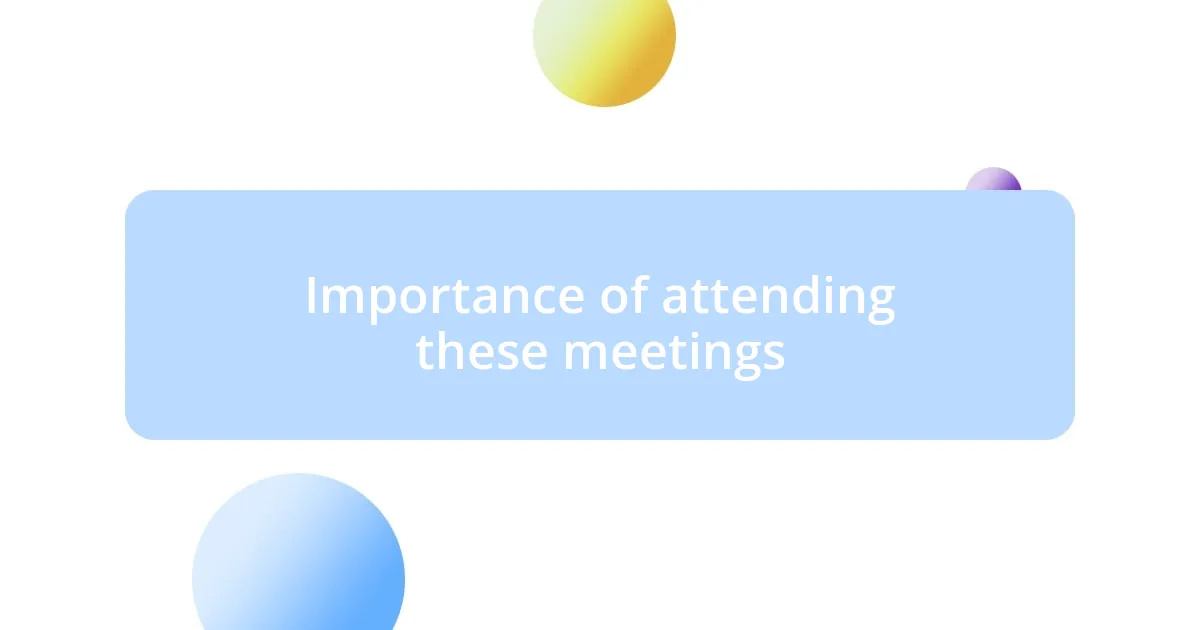
Importance of attending these meetings
Attending local government meetings is more than just a routine obligation; it’s a chance to directly impact the community. I recall a moment in one meeting when a neighbor passionately voiced his concern about a proposed development project. That discussion sparked a wave of additional voices, and together we were able to influence the decision-making process. This collaborative spirit highlighted how every attendee can play a vital role in shaping local policies.
Here are a few reasons why attending these meetings matters:
- Voice Your Opinions: It provides an opportunity to express your views on issues that directly affect your neighborhood.
- Stay Informed: You gain insight into local issues, initiatives, and decisions that may not be covered in the media.
- Network with Community Members: It fosters connections with like-minded individuals who care about similar issues.
- Influence Change: Engaging in discussions allows you to advocate for changes you want to see in your community.
- Build Trust: Attending regularly establishes a relationship with local leaders, making it easier to address concerns in the future.
Each meeting is an opportunity for dialogue and progress, and that’s what keeps me coming back.

How to prepare for meetings
Preparation is key when it comes to attending local government meetings. I remember my first meeting; I showed up without any agenda and quickly realized I was out of my depth. Now, I always take the time to review the meeting agenda beforehand, jotting down any questions or comments I have. This way, I can contribute meaningfully to the discussion and feel more confident about voicing my opinions.
Equally important is understanding the topics at hand. I like to do a little research on the issues being discussed. Whether it’s reading local articles or checking community forums, having background knowledge allows me to engage in conversations more fluently. For instance, knowing the implications of a new zoning law can change how I perceive a proposed development, turning my trepidation into informed advocacy.
Finally, it’s essential to arrive with an open mind. I’ve found that meetings can take unexpected turns, and being receptive to new ideas can be enriching. I recall a moment when a fellow resident shared a perspective on public safety that completely shifted my viewpoint. Embracing different opinions helps foster a collaborative atmosphere, making these meetings a true representation of our community’s diversity.
| Preparation Steps | Description |
|---|---|
| Review Agenda | Familiarize yourself with topics to contribute meaningfully. |
| Research Topics | Gather background information for informed discussions. |
| Arrive Open-Minded | Be receptive to different perspectives for productive dialogue. |

Key issues to follow
Key issues to follow in local government meetings often revolve around budget allocations, changes in zoning laws, and community development projects. I remember a particularly heated debate about funding for local schools; the passion in the room was palpable as parents and educators advocated for resources to enhance our educational system. This experience underscored for me the importance of staying informed about these financial decisions, as they directly affect our children’s futures.
Another crucial topic is zoning regulations, which can significantly impact the character of a neighborhood. I once attended a meeting discussing a proposed high-rise in a low-density area. As community members shared their thoughts, it became evident that many were worried about losing the charm of our neighborhood. It was a reminder of how our local landscape is shaped by such discussions; staying engaged helps ensure our community’s values are upheld.
Don’t overlook the significance of public safety and infrastructure issues; they are often at the top of everyone’s minds. I recall a town hall where we discussed a rise in traffic accidents due to inadequate road conditions. Listening to personal stories from those affected made me realize how interconnected we are and the weight of decisions being made at these meetings. Are we doing enough to protect each other? I felt compelled to advocate for improvements, and it was clear that many in the room shared that urgency.
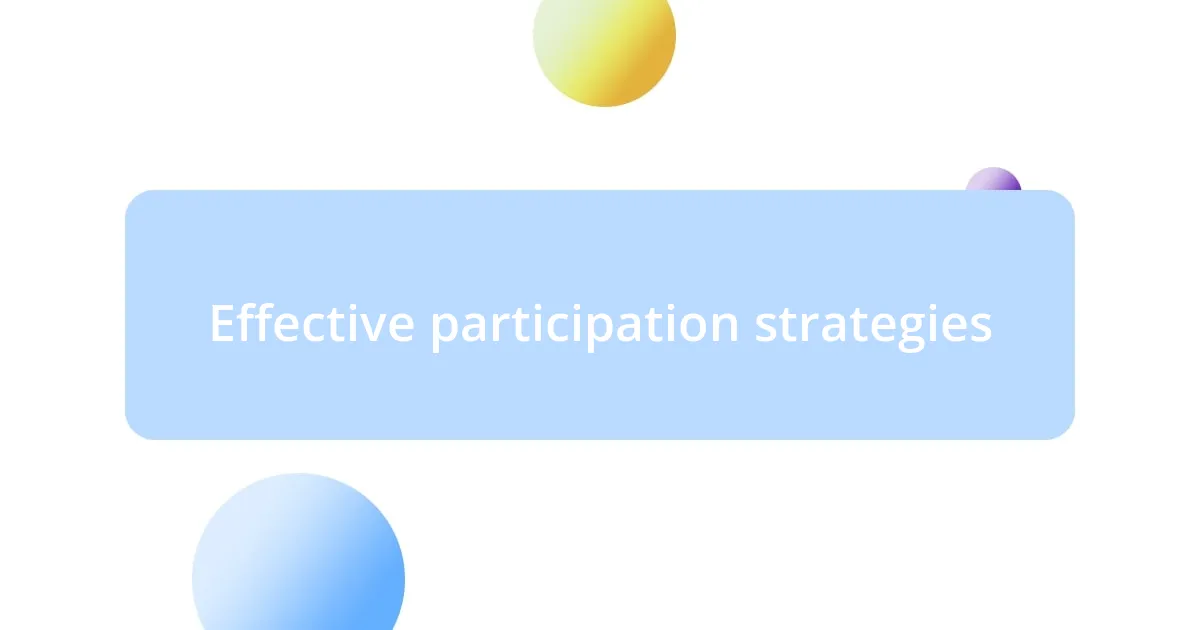
Effective participation strategies
Effective participation strategies can truly elevate your experience and impact in local government meetings. One strategy I’ve found invaluable is networking with fellow attendees. Just last month, I struck up a conversation with a resident who had been attending meetings for years. We exchanged contact information and committed to discussing agenda items together before the next meeting. This connection not only made me feel more prepared but also opened the door for deeper insights and a sense of community.
Engaging actively during discussions is another key strategy. I vividly recall a meeting where I hesitated to speak up about a traffic congestion issue affecting my route to work. But when I finally shared my experience, I was amazed at how many others echoed my concerns. It was a powerful reminder that our voices matter. Have you ever felt that way? Taking the leap to share personal anecdotes can resonate with others and spark meaningful dialogue, transforming individual experiences into community-wide discussions.
Lastly, following up after meetings can reinforce your involvement. After voicing my concerns about a local park’s maintenance, I decided to send an email to my council member. I expressed my appreciation for their efforts and reiterated my thoughts about community green spaces. The response I received was positive, and knowing that my voice reached them was incredibly rewarding. Isn’t it satisfying to see that kind of engagement culminate in a responsive dialogue? By staying proactive, you not only maintain the momentum of the conversation but also keep yourself aligned with ongoing community efforts.
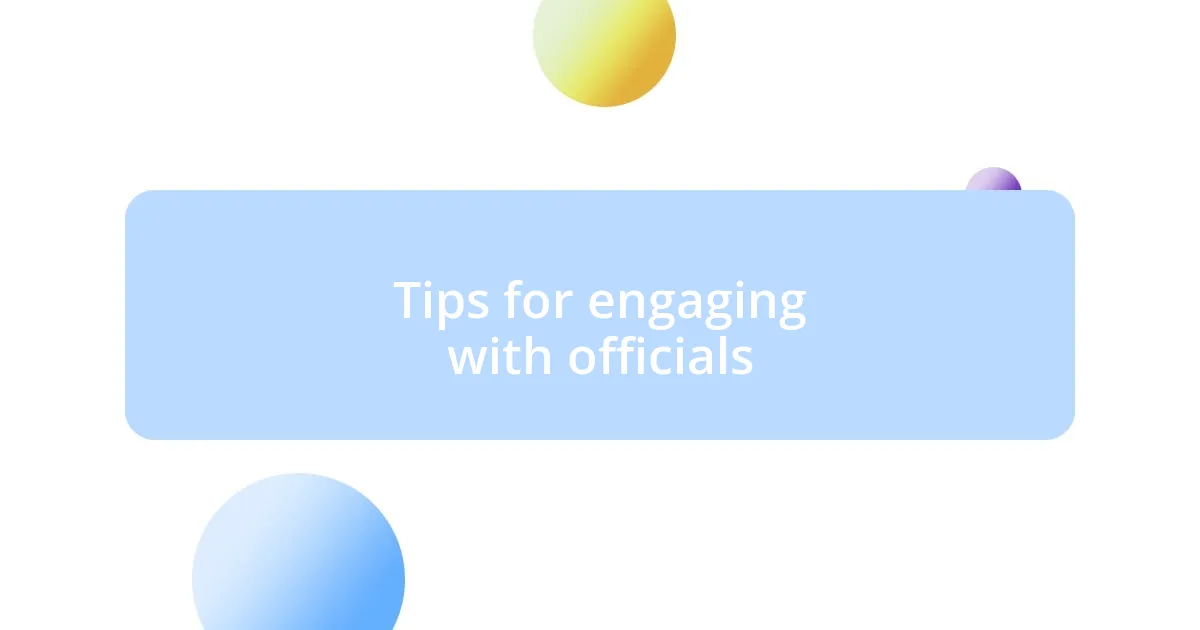
Tips for engaging with officials
One effective tip for engaging with officials is to come prepared with specific questions or comments about the issues at hand. I remember attending a meeting where local officials discussed urban development. Instead of sitting quietly, I prepared a question about the environmental impact of the proposed projects. When my turn came, voicing my concern felt empowering, and I saw nods of agreement from others in the room. Have you ever felt that rush of validation when you’re advocating for something you believe in? Preparation not only clarifies your thoughts but also demonstrates to officials that residents are invested in the decision-making process.
Building rapport with officials is another crucial strategy. After a typically dry city council meeting, I approached the mayor and casually mentioned a community event they had attended. To my surprise, they remembered it vividly and engaged me in a genuine conversation about its success. This small interaction made me realize that humanizing these officials can lead to more meaningful exchanges. When you find common ground, it encourages a more open dialogue—wouldn’t it be great if we all felt comfortable reaching out like that?
Lastly, follow-up is essential. After a recent meeting discussing public transportation improvements, I took the time to send a thank-you email to the committee chair. I highlighted how the conversation had influenced my perspective on commuting in our area. Not only did it feel good to express appreciation, but I also received a thoughtful response that included additional resources. Isn’t it amazing how a simple follow-up can deepen your connection with local leaders? Sustaining that communication makes it easier for officials to remember you and the concerns you represent.
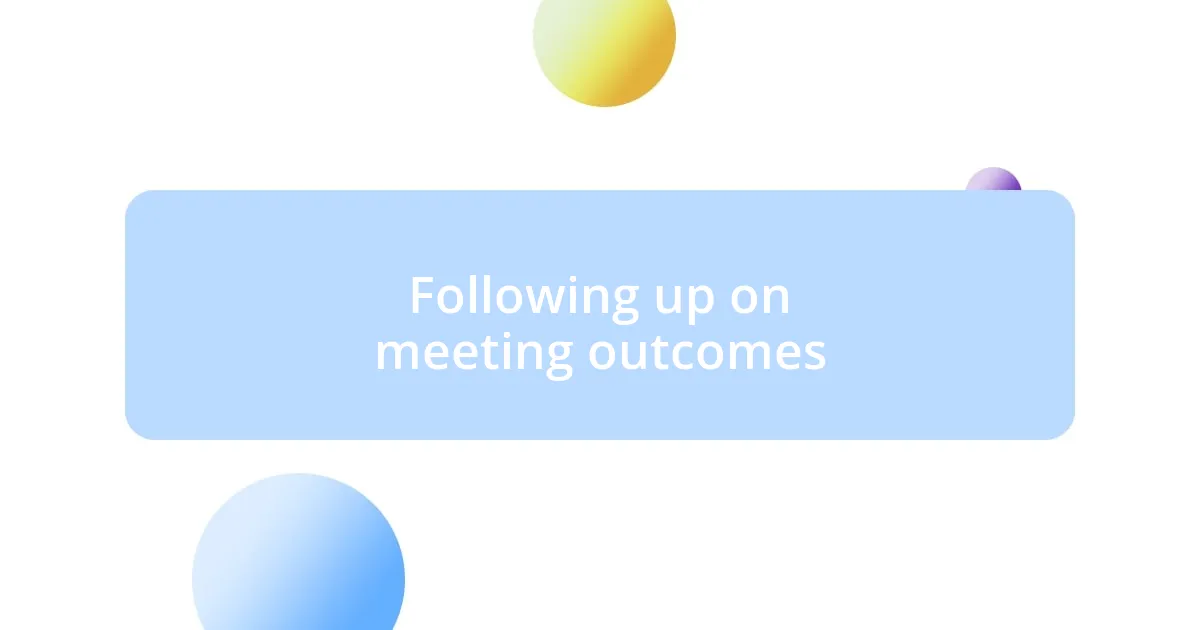
Following up on meeting outcomes
Following up on meeting outcomes is something I truly believe can enhance community engagement. I recall a time when I attended a local board meeting addressing housing concerns. After the meeting, I made it a point to reach out to a couple of participants via email. We shared our thoughts and ideas and decided to collaborate in drafting a community petition. This experience taught me how follow-ups can not only solidify connections but also empower us to push for meaningful change together. Have you experienced a similar motivation after reaching out?
It’s fascinating how following up can make you feel more connected with your local government. During another council meeting, I expressed my concerns about pedestrian safety near a busy intersection. A week later, I sent a concise email to the traffic committee, thanking them for their work and asking about updates on proposed safety measures. The response not only acknowledged my input but also included detailed information on what steps they were taking next. That acknowledgment felt incredibly validating—doesn’t it warm you to know your voice has been heard?
Lastly, keeping a record of discussions can be invaluable for future engagement. I once started a simple spreadsheet to track the topics discussed at meetings, along with my follow-up actions. It became a useful tool when I revisited the council a few months later to inquire about progress on enhancing local public parks. The officials appreciated my initiative, and it kept our conversations focused and productive. Have you considered how tracking outcomes could elevate your discussions? Following up isn’t just a formality—it’s a chance to grow our community’s dialogue.












